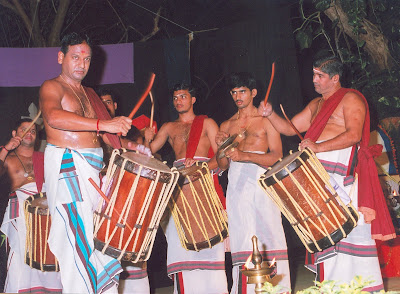Keli Rhythm Festival 2012
Keli Rhythm Festival 2012
(On rare and vanishing traditions of Thayambaka)
KELI is a Mumbai based organization striving to preserve, develop and propagate the classical cultural heritage of India ,many of which are now on the verge of extinction. Keli has been active in this field for over the last two decades and during this period has successfully handled a number of important projects in furtherance of its objectives. The annual Keli festival, structured thematically every year are well known to artists and art lovers of the city and have earned the organization a significant place in the cultural life of Mumbai.
The second phase of Keli’s twentieth anniversary celebrations is scheduled to take place at the Horniman Circule Garden on January 12, 13 and 14, 2012. The festival will feature Thayambaka, a unique and distinct style of Kerala’s Rhythm music.Inevitably many diverse traditions of Thaymbaka based on insular performing styles sprang, developed and flourished. For a variety of reasons, many of these distinct forms became rare and some of them totally vanished from the scene of Rhythm Music.
Keli has devised the present Thayambaka Festival as a revival of some of these rare and lost traditions, known for their structural strength and beauty of presentation. Among the styles featured are “Chempada Kooru” (eight basic beats), “Lakshmi Thalam” (21 beats), and Patinja Champa (5 beats in slow tempo).
The revival of these traditional forms has been possible through the rich experience of a few great exponents who are fortunately still among us , and also the oral evidence of considerable logical force and value passed on through the word of mouth.
We are these days familiar with performances totally bereft of the most essential academic precision and subtlety. Perhaps this downward inclination is born out of the limitations of contemporary life style which is a constant battle against time, striving to achieve the most within the least time. Keli’s efforts are directed towards resisting such temptations and retrieving the essential values of our art forms which are being neglected and even rejected. Several artists perturbed over the current crisis in the arts are most willingly with Keli in these efforts. Keli’s three day Thayambaka festival featuring three rare performance styles will be held at the Horniman Circle Garden on the 12th, 13th and 14th January 2012 at 7.45 pm. The unending creativity and sustained dedication of the participating artists will make this exposition of Thyambaka an unforgettable and wondrous aural experience.
We cordially invite all art lovers of Mumbai to share the joy and excitement of this unique rhythm festival.
Rare and Vanishing Styles of Thayambaka
Chempada Kooru
The structure of Chempada Kooru is arranged through the configuration of the eight basic beats. This style of Thayampaka flourished originally in the Madayikkavu village of Kannur district,Kerala. This style many have its origin in the rhythm of the dance of the Oracle (Velichapad) during the ‘Para’ a ritual of the Bhagavati temples in the region. Several outstanding rhythm artists of the past generations were exponents and practitioners of this distinct style.
Lakshmi Thalam
This is a rhythm pattern widely used in the traditional Sanskrit theatre from Koodiyattam. Its structure is based on 21 beats and the style was practiced widely in the Malappuram and Kozhikode districts. Several Rhythm artists in and around Kottakkal engaged the possibilities of their style of drumming in the exposition of Melappadam in Kathakali.
Pathinja Champa Kooru
It was simultaneously with the Thaymbaka of the Malamakkavu School, reputed for its fast tempo, that the graceful champakooru, thayambaka in very slow tempo also received much adulation and acceptance. A number of celebrated Rhythm artists of South Malabar have presented Thayambaka in this unique style.
Partcipating Artistes
Panamanna Sasi
Panamanna Sasi is an artist of the present generation with an innovative and inquisitive bent of mind. He has been acclaimed as one capable presenting Thayambaka sticking strictly to the principles of his tradition without moving even an inch outside the prescribed boundaries, yet in a manner that attracts the attention and respect of contemporary spectators. The accuracy of the timing of beats the purity and dexterousness of his training and practice, his innovativeness are some of the factors that lend power colour and vitality of his Thyambaka. He received initial training from his father, Panamanna Appu Poduval. Later it was his good fortune to study under such stalwarts as Pookkattari Rama Poduval, Kalamandalam Chandra Mannadiar, Kottakkal Kuttan Marar and Kottakkal Krishnan Kutti Asan and it is this moulding that makes him a shining star in the horizon of Thayambaka.
Sukapuram Dileep
Dileep is the disciple of the distinguished Thayambaka exponent of the Late Pookkattiri Divakara Poduval. The strength of his performance is based as his extensive training and sadhana, his respect for tradition and innovative presentation. His remarkable feat of performances all over the festivals in Kerala harmoniously linking diverse style of Thyambaka found him a place among the art lovers who adore the purity of tradition in this art form. He’s placed in the Limca book of world records for playing Thayambaka continuously for 25 hrs for the first time in the history.ssssThe other participating artists are Vinu,Gopi,Sathish,Ravi,Dipu, Murali,Nikhil,Vinod, Mahesh and Vineesh
Festival Schedule
Thursday,12th Jan
Thayambaka of Chempada Kooru
by
Panamanna Sasi & Group
Venue: Horniman Circle Garden
Time: 7.45 pm (Duration 1hr 20mts)
Friday,13th Jan
Thayambaka of Lakshmi Thalam
by
Panamanna Sasi & Group
Venue: Horniman Circle Garden
Time: 7.45 pm (Duration 1hr 20mts)
Saturday,14th Jan
Thayambaka of Pathinja Champa Kooru
by
Panamanna Sasi, Sukapuram Dileep & Group
Venue: Horniman Circle Garden
Time: 7.45 pm (Duration 1hr 45mts)
Free entry passes will be available from Rhythm house, Giri Stores Matunga,Prithvi Theatre and Maharashtra Watch company, Dadar , 2 days prior to the festival.




Comments
Post a Comment